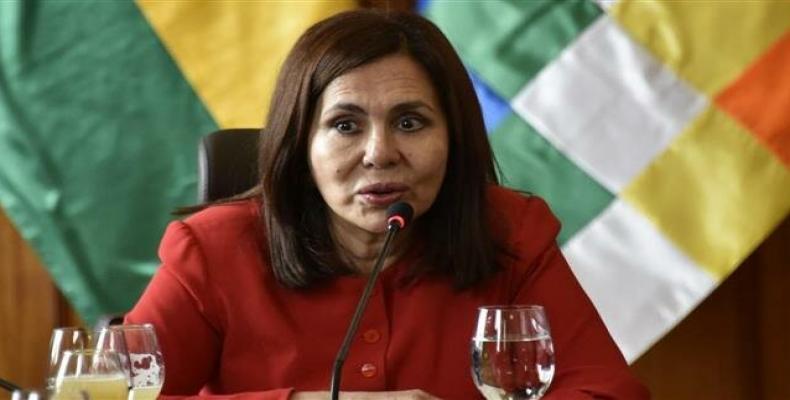La Paz, November 30 (RHC)-- Bolivia's new interim government, which gained power following the coup that ousted Bolivian President Evo Morales, has announced plans to renew ties with Israel.
Speaking with international media, interim Bolivian Foreign Minister Karen Longaric said the country plans "to restore relations with Israel," but did not give a date for the planned measure or elaborate on any other related details.
Morales had cut relations with Tel Aviv in 2009 shortly after Israel carried out a deadly three-week incursion into Gaza, killing 1,282 Palestinians, 333 of whom were children.
"Bolivia had diplomatic relations with Israel. [But] considering these grave attacks against... humanity, Bolivia will stop having diplomatic relations with Israel," Morales said at the time in a speech addressing diplomats in his government palace.
Morales said that he was seeking to ask the International Criminal Court (ICC) to charge Israeli officials for the killings. In 2010, Morales also formally recognized Palestine as a sovereign and independent state within the 1967-defined borders.
La Paz's change in policy towards the Israeli regime comes after Morales was forced to resign on November 10 under pressure from the armed forces after the country's U.S.-backed opposition rejected the country's October election results. Evo Morales has said there is evidence that Washington orchestrated his ouster.
Speaking to reporters, Longaric said the Morales government's move to cut ties with Israel "did not take into effect the collateral effects, such as economic and trade issues." Longaric added that she hoped renewed relations "could lead to positive aspects for both sides and contribute to Bolivian tourism."
In a statement issued from Tel Aviv, Israeli Foreign Minister Israel Katz welcomed the measure. He said his ministry had "actively worked for a long period of time to promote the renewal of the relationship also with the help of the Brazilian president and minister of foreign affairs."
“The departure of President Morales, who was hostile to Israel, and his replacement by a government friendly to Israel, allows the fruition of the process,” he added.
The power shift in La Paz and the country's renewed interest in relations with Israel comes as a number of Central and South American countries, notably Brazil, have adopted increasingly pro-Israel positions in line with policies of U.S. President Donald Trump.
Guatemala opened a new embassy in Jerusalem al-Quds in occupied Palestine shortly after the U.S. formally transferred its embassy from Tel Aviv to the city in May 2018, which prompted worldwide condemnation and anger among Palestinians.
In August, Honduras also recognized Jerusalem al-Quds as the so-called capital of Israel and announced that it sought to open a diplomatic office there.


